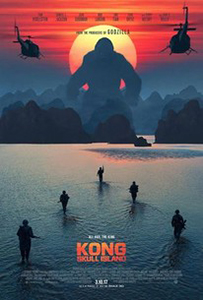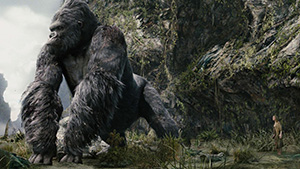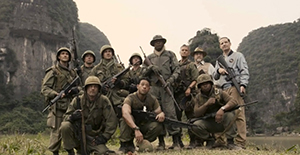As “Kong: Skull Island” enters its final act, there’s a memorable exchange between anti-war photojournalist Mason Weaver (Brie Larson) and aggressively gung-ho Lieutenant Colonel Preston Packard (Samuel L. Jackson), one that more or less crystalizes the film’s intent as both a semi-remake and a standalone adventure. “The world is bigger than us,” Weaver intones melodramatically, stink-eyeing Packard as he prepares to napalm the towering ape who killed most of his men. Just before you, the jaded viewer, have the chance to say it yourself, the always reliable Jackson turns on her and yells: “BITCH, PLEASE!”
Unapologetically loud, violent, and often thoroughly disgusting, Jordan Vogt-Roberts’ “Kong: Skull Island” feels as much a response to the criticisms of Peter Jackson’s 2005 film as it is a reboot in search of its own identity. Jackson lovingly, and somewhat controversially, paid homage to Merian C. Cooper’s groundbreaking special effects extravaganza while, some would argue, inflating the narrative to unbearable size with a love story that rendered the entire thing ridiculous. If any such point of comparison can be made in this 2017 reimagining, it’s to the 1976 remake by John Guillermin, in which the updated story was infused with commentary on man’s plundering of natural resources. Indeed, the 1970s iconography, informed by the turbulent final days of the Vietnam War and the brief but intense pseudoscientific interest in cryptozoology, Hollow Earth theory, and other speculative matters, provided the backdrop for “Kong: Skull Island,” along with dire warnings that Mankind’s weapons and selfish goals will serve only to destroy him. Having this latter point underscored with Credence Clearwater Revival just makes it easier to groove to.
If “Kong: Skull Island” owes any great narrative debt, it’s not to Cooper, Guillermin, or Jackson; the familiar characters of Ann Darrow, Jack Driscoll and Carl Denham are nowhere to be found in this version. Instead, Vogt-Roberts and screenwriters Dan Gilroy and Max Borenstein borrow liberally from Joseph Conrad’s “Heart of Darkness” and the film so famously inspired by it, “Apocalypse Now.” Thus, “Kong: Skull Island” becomes a story of obsession, with new but familiar characters journeying by river into an ancient, primeval world where man and monster meet, discovering their own reflection in the alien Other. There’s a former soldier “gone native” in the style of Brando’s Colonel Kurtz (John C. Reilly), and Packard’s Ahab-like fixation on murdering the titular monkey is Captain Willard in all but name. It’s not as if the film tries to hide it: two of the key characters are named “Conrad” and “Marlow,” and helicopter imagery seems intent on reminding you of Coppola’s greatest cinematic achievement. Throw in a pissed off, monstrous ape, and you get the weirdest combination of iconic films in recent memory. Perhaps not surprisingly, it works for these very reasons, as Jackson himself flirted with the “Heart of Darkness” connection in his take on the story. “Kong: Skull Island” simply abandons any semblance of pretense and wears its influences on its sleeve. The fact that it’s not called “Apocalypse Kong” almost feels like a missed opportunity.
And yet Kong is the one character not given to obsessive behavior here, despite that being the defining aspect of the creature since 1933. Always pining for the idealized blue-eyed, blonde-haired woman, this Kong is rebranded as a jungle protector, one whom the natives worship out of respect rather than fear. (Making him singular in a pantheon of deities who rule under threat of violence, which is arguably a perfectly acceptable expectation from a gorilla the size of a building). Apart from decimating the bulk of the white intruders who firebomb his island in an effort to engage him, Kong’s a pretty sedate if temperamental king. We see him performing public service, such as the rescue of an animal that looks like a cross between a stegosaurus and a floor mop; earlier cinematic Kongs were too busy throwing temper tantrums to engage in charitable acts. You can’t really blame him for bringing down our alleged heroes, who learn in true morality play-style that if you push against Nature hard enough, it can push back. It’s the concept of “the noble savage,” friendly and Happy Meal ready.
The rest of the cast is hit or miss, as the ensemble is too large to allow for a focused protagonist. John Goodman and Samuel L. Jackson, playing the scientific and military expedition leaders, respectively, are reliable, though neither deviates far from what we’ve come to expect from other comparable appearances. Tom Hiddleston, oddly miscast as a hard-drinking and embittered tracker, makes little impression except for the occasions in which he’s flexing his forearms (of which I counted two). Brie Larson’s greatest contribution to the proceedings is to become a source of ongoing distraction once her wardrobe is reduced to a sweaty tanktop and a none-too-subtle camera strap that accentuates her character’s more prominent attributes (by which I mean the fact that she’s a photographer, of course). The rest of the cast are little more than walk-ons. Only John C. Reilly shines, providing the film’s heart as Jackson provides the balls. On the subject of genitalia: this Kong is too busy for unrequited love, granting himself (and perhaps the audience) only a brief moment of restrained quasi-romantic flirtation with the leading lady. In granting Kong nobility, he becomes oddly castrated.
Yet this is unquestionably part of a corporate-minded plan to make a hero of a brute, as is revealed during the now-obligatory post-credits stinger, in which (SPOILER) an entire “Monsterverse” is advertised, seemingly to the surprise of no one. Considering that “Kong: Skull Island” features four current or upcoming members of Marvel’s ongoing “Avengers” franchise, one can be forgiven for wondering whether a given film is designed to tell a story with a beginning, middle, and end, or simply serve as two-hour commercial for a slew of product to follow. Both narratively and commercially, “Kong: Skull Island” is wonderful fun that ends with a hint of bad things on the horizon.
Directed by Jordan Vogt-Roberts
Written by Dan Gilroy, Max Borenstein, and Derek Connolly
Rated PG-13 for intense sequences of sci-fi violence and action, and for brief strong language
Trailer






Leave a Reply
You must be logged in to post a comment.